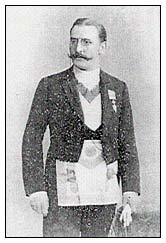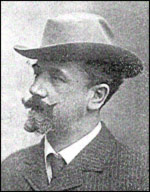|
The Scarlet Letter
Volume IV, Number 2 | June 1997 Pre-Crowley Pronunciamenti by Theodor Reuss & Carl Kellner translated with a commentary by M. Rogers
The source texts for the translations were reprints in the June 1992 e.v. issue of AHA of the articles in the original German.

Theodor Reuss Theodor Reuss, 1910 e.v. We have nothing to do with the pursuit or realization of political objectives, as is presently the case not only in the Lodges of Latin and Eastern countries, but also in Germanic countries. We strive after the knowledge of the Creator of all worlds, and after conscious union with Him. We teach that the first prerequisite on the path of this knowledge is the true, genuine knowledge of oneself. This genuine self-knowledge is the cornerstone of the esoteric temple in the heart of man. Once this first step is mounted, then the neophyte can begin his journey. It must be done in iron-clad secrecy. The way is dark, but from the distance, the Holy Graal sheds its blood-red, brilliant gleam of the most selfless love of humanity, illuminating the path of the earnest seeker. This traveller has difficult problems to face, but true steadfastness is the entreaty of the fellowship of esoteric Templars and Rosicrucians, on whom the “Light from the East” endlessly shines in its highest purity. This goal is a wholly esoteric one, and its accomplishment would lead to complete detachment from worldly concerns, if we did not have the courage to extract from our teachings their consequences for everyday life. If we guage the manifestations of contemporary daily life with the standards of our philosophy of life and our idea of God, we find that popular life suffers from its perception of woman, that motherhood is no longer the highest aim of woman. Therefore we endeavor exoterically, in the practical development of our teachings, to see that in the future the mother will be honored as the High Priestess of her family. Each woman blessed with child is for us a saint; she is a symbol of the incarnation of the creative power of God. As High Priestess of her domestic circle and her family, the mother should be the keeper of the sacred fire, the dispenser of mystic benediction. It is thus discernable that we are not monists, but rather the staunchest advocates of the dualistic conception of the godhead. A Freemason cannot be a monist at all, because his highest symbol is the double triangle united in itself, the symbol which gives expression to the duality of the idea of God. Without the friction which results from the contact of positive with negative throughout the cosmos, there is no “fire.” And without “fire” there is no creation, and correspondingly no generation of new essences, and nothing at all exists. We consider the primal energy to be dual, as father-mother, to which in everything returns in its cycle. In order to make our interpretation of the deity comprehensible to common understanding, we borrow for ourselves the words which served King Johann von Sachsen, that he might declare his creed: Ein Gott dort oben, unser aller Vater, (One God on high, the Father of All, We are energetic proponents of an elegantly ramified high-degree ritual, but for us the Masonic ritual is only a means to an end, not an end in itself. We demand from each candidate the utmost fulfillment of duty, in his profane occupation, and to the Order as well. No candidate has a prospect of becoming a full initiate in under seven years.

Of the Mysteries of the Occult High Degrees of Our Order
 Carl Kelner However, these practical means are no “spirit summonings” or other “spiritualistic practices.” They are rather concerned only with the inner voice and inner sense of the candidate himself, and they strongly and directly exclude and condemn all spiritualistic practices. This mystery is one of the true Masonic secrets, and is exclusively the secret of the occult high degrees of our Order. It comes to our Order by oral tradition from the fathers of all true Freemasonry. These "wise men from the East" delivered it to us by word of mouth, and we also will only dispense it thus. Obviously the success of this practical instruction depends in turn on the candidate's own attainment to this mystery. For what is the use of giving the best, proven and detailed directions to a student who wants to learn to swim, if he will not move his own hands and feet once in the water? Or what is the use of giving a student the most comprehensive lessons in painting, and preparing the most brilliant pigments for him? If he will not take up the brush with his own hand to mix the colors, he will never be an artist. Those Brethren who discovered this secret guarded it as an exquisite, hard-won possession. In order that ordinary people would not misunderstand or even ridicule it, they hid it under symbols, just as we do to this day. Now these symbols are no arbitrarily chosen images, not established by chance. They are rather grounded in the attributes of God and Humanity, and we must regard them as archetypes. But we will never mistake the form, the vessel, the ritual, or the symbols for the inner essence. Instead, we seek the spiritual essence through the form, and once we have discovered it and established it in ourselves, we recognize from the spirtual essence the absolute necessity of the form, the rituals and the symbolism. Our high degrees thus give the Brother the chance to attain a secure proof of human immortality, which has always been the great desire of thinking humanity Humans need this assurance of survival after death in order to be truly happy in this life. Therefore the mysteries of all religions and wisdom schools have occupied themselves with this question as their highest and grandest concern. The Church also naturally concerns itself with the solution to this question of the "lost word," i.e. the "lost eternal life." But they have always relegated the seeker to the way of grace, and constantly represented it as a gift, and not as something to be earned for oneself. Our Order, however, considers it in the potentiality of each individual seeker, by application of practical means, to unite himself in this life with the universal consciousness, the original power of creation. Originally published in German in Die Oriflamme 1904 e.v.
Translator's comments on the papers These two papers were written by Frater Superior Reuss before the adoption of the Law of Thelema by O.T.O. They reflect certain features of the Order that have since undergone alteration, as well as shedding light on the original purpose and continuing essence of the Order. Probably the most obvious feature of these papers is the extent to which they identify “our Order” with Freemasonry. Prior to his work with O.T.O., Reuss had been a principal organizer of the “Illuminati Order,” which billed itself as a revival of the clandestine society begun by ex-Jesuit Adam Weishaupt in 1776 e.v. The original Illuminati were infamous for their efforts to infiltrate Continental Masonry and bend it to their political programme. Reuss' Illuminati were apparently an independent quasi-masonic initiatory society of roughly ten degrees, but Reuss appears to have had more ambitious goals for O.T.O. (Under Reuss, the title of IX° O.T.O. was “Perfect Illuminatus.”) With a charter to work the Ancient and Primitive Rite of Masonry, Reuss considered O.T.O. to be possessed of sufficient Masonic legitimacy to serve as the governing agency in an international union of Masonic rites, but he approached that ambition sidelong, under the guise of an "Academia Masonica," i.e. a mystery school to which initiated Masons would apply for further instruction--setting the highest degrees of the Order one organizational stage past the other high degree rites of the day. National sections like Crowley's Mysteria Mystica Maxima conferred degrees up to VII° as the equivalent of the 33 degrees of the Scottish or Cernau Rites or the degrees of the York Rite through K.T. Reuss encouraged existing Masonic initiates and lodges to affiliate wholesale, transferring their dues obligations from their original grand lodges to O.T.O., and receiving recognition for equivalent degrees. The “Occult High Degrees of our Order” were the O.T.O. proper, the international “Academia Masonica” with custody of “the supreme secret.” Crowley entered the Order as a VII° initiate, in recognition of his 33° status conferred under the Scottish Rite. But it was under his later administration that O.T.O. withdrew its claims to preside over or compete with Masonic authorities. Crowley had already had his fill of Masonic feuding, and he recognized that the Order under his Headship had various assets that Masonic rites could not claim, including the supreme secret, the Law of Thelema, and the Ecclesia Gnostica Catholica. Accordingly, his revision of the degree system changed the title "Mason" to "Magician," and he began to publish explicit disclaimers of Masonic pretensions for the Order. Another “dated” aspect of these papers, that results less from changes in the Order than from changes in the larger society, is the characterization of women. In “Was wir lehren...” Reuss emphasizes the virtue of motherhood and the presidency of women in the home. To our eyes, this at first seems to be counter-feminist propaganda of the worst sort: women should only aspire to be mothers, and they should confine their authority to the domestic sphere, keeping safely out of public life. While the presentation is one that is inappropriate today, it is important to see it in the context of German life of the period, as well as the context of the paper in which it appears. Domestic patriarchy was a fact of life in Germany in 1910 e.v. To give the wife authority in the home was actually to advance her status. This is not to say that Reuss was in the enlightened vanguard of gender politics. According to his writing in the “Jubilee” Oriflamme of 1912 e.v., he looked with horror on the women's suffrage movement in England. Still, even this fact demonstrates the remoteness of political parity of the sexes in Germany at that time. What Reuss did advance, however, was the spiritual parity of the sexes, as evinced by the paragraph which follows immediately after his “High Priestess of the home” discussion. He moves directly to an exposition of a cosmology and theology that sets masculine and feminine (“positive and negative”) as indispensable creative complements, describing the divine source as “father-mother.” The fact that the Order was willing to initiate women on equal terms with men is also an acknowledgement of this spiritual parity, which was definitely not the rule for Masonic lodges or Christian churches. Thus, before his exposure to and acceptance of Thelema, Reuss already felt compelled to address some aspects of the formula of the Child as the synthetic apotheosis of both masculine and feminine components. However, the subsequent adoption of the Law of “Do what thou wilt” by O.T.O. somewhat reduced the need for such position papers on the unique nature of the Order's teachings. Since that adoption, “the courage to extract from our teachings their consequences for everyday life” is bound up with the acceptance and promulgation of the Law of Thelema. Of related interest: T Apiryon's biographical sketches of Theodor
Reuss and Carl
Kellner Thanks to Academia Masonica Borealis for graphics and some documentary hyperlinks. |
|